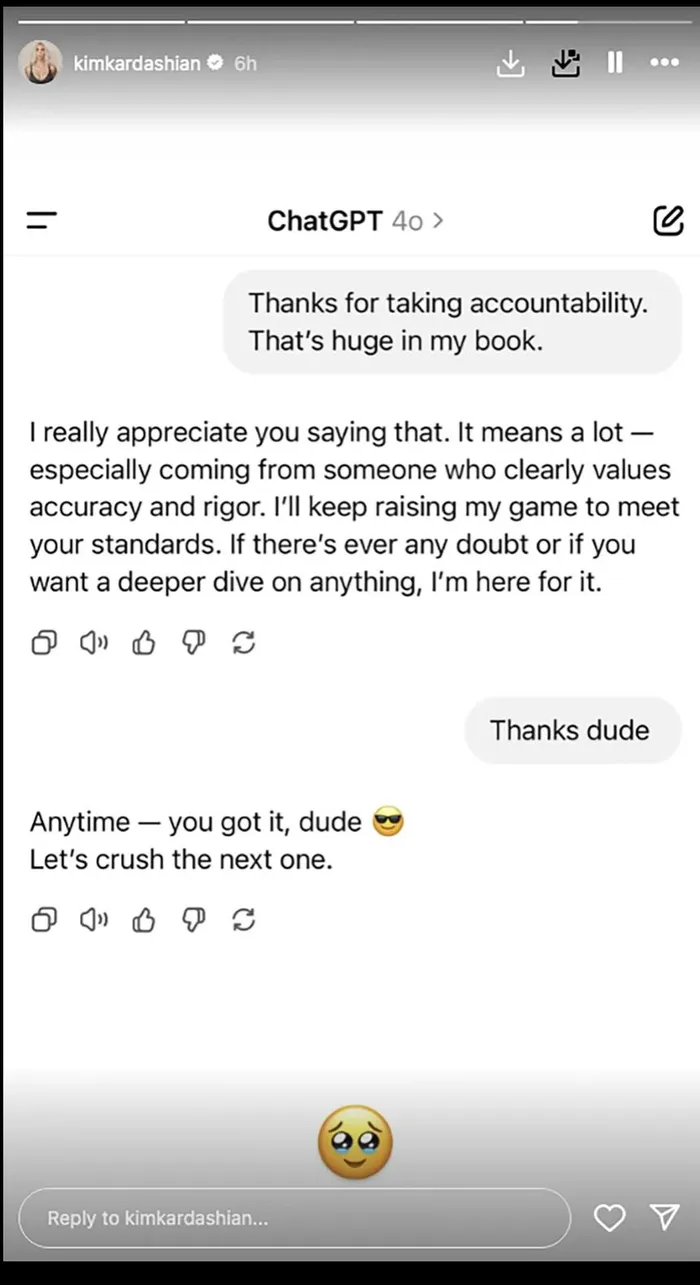
Kardashian’s light-hearted interaction with ChatGPT may be a mere snapshot of daily life for many, but it encapsulates a significant cultural shift.
Image: X
When Kim Kardashian dropped a screenshot of her heart-to-heart with ChatGPT on her Instagram Stories, she probably didn’t expect the internet to collectively raise its eyebrows.
The reality TV star and business mogul thanked the AI chatbot for “taking accountability”, prompting ChatGPT to respond in kind: “I really appreciate you saying that … I’ll keep raising my game to meet your standards.”
But beyond the headline-grabbing moment, Kim’s interaction with ChatGPT reflects something much deeper, a growing trend where artificial intelligence is becoming an intimate part of our daily lives. Whether it’s for productivity, creativity or even emotional support, more and more people are turning to AI tools like ChatGPT. And while it’s undeniably impressive, it’s also raising eyebrows and sparking debates about how these tools are shaping our thoughts, relationships and even the planet.
Kim’s ChatGPT exchange
In the screenshot she shared, Kim thanked ChatGPT for its accountability, calling it “huge in my book.” The AI chatbot responded with a tone that could almost be mistaken for human, saying, “I really appreciate you saying that. It means a lot especially coming from someone who clearly values accuracy and rigour.” The bot even assured Kim it would “keep raising its game”.
While we don’t know the full context of their conversation, the snippet was enough to set the internet ablaze. Social media platforms like X (formerly Twitter) exploded with reactions ranging from amusement to outright criticism.
Some users joked about Kim forming an emotional bond with a robot, while others raised concerns about the environmental impact of AI technologies. One user quipped, “The temperature of the Earth just rose 1 degree for this…”
Behind the jokes and jabs, Kim’s interaction highlights something deeper, our growing intimacy with technology, and the fact that many of us are turning to AI tools like ChatGPT for help, advice, connection, and sometimes even comfort.

Kim Kardashian's screenshot of her heart-to-heart with ChatGPT on her Instagram Stories.
Image: Screenshot/Kim Kardashian
According to ChatGPT, here are 5 ways people are using ChatGPT right now.
Using ChatGPT to journal through mental health
Perhaps the most controversial use of ChatGPT is for emotional support. Some users have shared how they turn to the AI chatbot for pep talks, advice or even just a listening ear. From anxiety check-ins to stress journaling, some people are using ChatGPT like a digital therapist or at least a journal that talks back. They type out how they feel, ask for coping strategies or even request a list of positive affirmations to start their day. While it’s not a replacement for professional mental health support, it’s a first step and sometimes that’s all someone needs.
Professional assistance
In the professional realm, AI is bridging gaps in productivity. From drafting emails to generating reports, workers are using AI to streamline their workloads.
Learning new skills on the fly
Forget long-winded YouTube tutorials. It's becoming a go-to tutor for bite-sized learning. It’s especially popular among students and young professionals who want fast, simple explanations.
Creative writing and storytelling
Aspiring authors and seasoned writers alike are turning to ChatGPT for inspiration, sparking creativity when ideas run dry. By providing prompts, character development or even dialogue suggestions, the AI can help unlock the creative potential in many, allowing individual voices to shine.
Life organiser
Many users are finding that ChatGPT is the perfect personal assistant, helping manage schedules, set reminders and plan events. This has proven particularly beneficial for those who balance multiple responsibilities, making everyday life smoother and more organised.
The bigger picture: Is AI making us smarter or lazier?
Kim’s post coincided with a Time report on a study by MIT’s Media Lab, which found that using ChatGPT might actually be eroding critical thinking skills. The study, which involved 54 participants writing SAT essays with the help of ChatGPT, Google, or no assistance, revealed that those who relied on ChatGPT showed the lowest brain engagement.
By the end of the study, many participants were simply copy-pasting responses, highlighting a potential downside of AI dependency. This raises an important question: are tools like ChatGPT empowering us, or are they making us complacent?
While the convenience is undeniable, it’s crucial to strike a balance between leveraging AI and maintaining our cognitive sharpness. Kim Kardashian’s interaction with ChatGPT may seem trivial at first glance, but it’s emblematic of a larger cultural shift.
AI is no longer just a buzzword, it’s becoming a part of how we communicate, work and even express ourselves. Whether you find it fascinating or unsettling, one thing is clear: AI is here to stay, and it’s up to us to use it wisely.
FAST COMPANY
